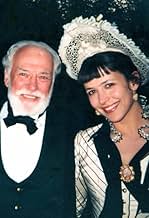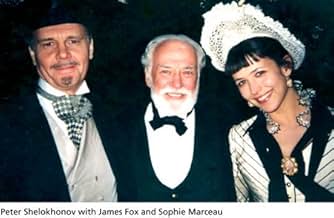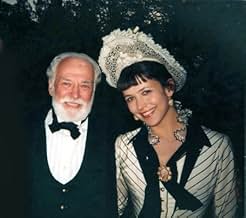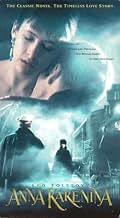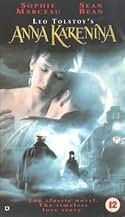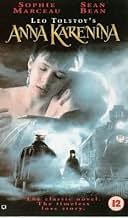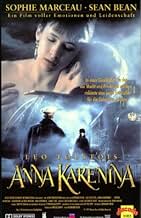IMDb-BEWERTUNG
6,3/10
6353
IHRE BEWERTUNG
Anna (Marceau) ist Ehefrau und Mutter, die eine Affäre mit dem hübschen Grafen Wronsky (Bean) hat. Nach dem Roman von Tolstoi.Anna (Marceau) ist Ehefrau und Mutter, die eine Affäre mit dem hübschen Grafen Wronsky (Bean) hat. Nach dem Roman von Tolstoi.Anna (Marceau) ist Ehefrau und Mutter, die eine Affäre mit dem hübschen Grafen Wronsky (Bean) hat. Nach dem Roman von Tolstoi.
Petr Shelokhonov
- Kapitonich, Chief Butler
- (as Pyotr Sholokhov)
Empfohlene Bewertungen
Of all the versions of the Tolstoy novel which I have seen (two with Greta Garbo, the deplorable one with Vivien Leigh, another with Jacqueline Bisset), this is the one that really reflects the scope and social observation of the book. The careful direction and art direction, the St.Petersburg backgrounds, as well as the exquisite cinematography, make this movie a real feast for the eyes, with magnificent plastic compositions and lighting in every shot. The abused Tchaikovsky music was used discreetly. Sophie Marceau plays a very young Anna, and makes her credible all the time. Sean Bean and James Fox, as Vronsky and Karenin, are admirable. And even if the screen play by director Bernard Rose is a little too literary, the complete story was told, and the result was the best Anna Karenina the screen has offered.
I saw this movie almost accidentally and I LOVED it! It made me a fan of Sophie Marceau, a beautiful and talented French actress. To my delight Sophie is starring in some upcoming movies (which I will not miss). I would recommend this movie to anyone looking for a movie with all the components that makes a classic. Too bad it didn't hit the mainstream, it was very under-rated. Bottom line: I loved this movie, and I am usually quite picky about which movies I say that about!
This was surprisingly good. I'm not that much a fan of the Romance genre, if truth be told, but I'll make an exception for this one. The film is carefully crafted. Every emotion, every dialogue enhanced the overall tone of the film, slowly but surely escalating in its momentum up to its tragic climax.
Sophie Marceau was brilliant. As was Sean Bean. I wasn't quite sure if they would be able to possess the kind of chemistry needed to pull this off, if truth be told, considering how they (in my opinion) seem to be of different temperament artistically (Sophie being more sensitive as seen in Braveheart and Marquis, while Bean is more explosive). Nevertheless, it worked out fine although, ironically, their relationship seem to be more believable whenever they fell out of odds with each other. :)
Sophie Marceau was brilliant. As was Sean Bean. I wasn't quite sure if they would be able to possess the kind of chemistry needed to pull this off, if truth be told, considering how they (in my opinion) seem to be of different temperament artistically (Sophie being more sensitive as seen in Braveheart and Marquis, while Bean is more explosive). Nevertheless, it worked out fine although, ironically, their relationship seem to be more believable whenever they fell out of odds with each other. :)
According to an earlier review, this movie is supposed to be "just plan awful." The writer probably meant "plain" instead of "plan," and that misspelling may be an indication of the quality of the review.
There is much to be said for the viewpoint that this film version of Tolstoy's novel, starring Sophie Marceau, must certainly be one of the greatest versions ever produced.
Tolstoy himself lived to see just the beginning of the era of the motion picture and was said to have been fascinated by the possibilities the new medium presented. If so, he would no doubt have been quite astonished at the beauty and the extraordinary quality of this rendition of his story about Anna Karenina. The production values are among the highest there could possibly be. The costumes, the cinematography, and the sets unlike earlier versions, the film was shot on location in St. Petersburg and elsewhere in Russia are at such a remarkable level that the action almost does appear to be really taking place in the Czarist period at the end of the nineteenth century.
As for Sophie Marceau's mild French accent which the above-mentioned reviewer found so irritating it is quite likely that many upper-classes Russians of the period actually did speak with a French accent. It was not Russian but French that was the dominant language among the Russian nobility and aristocracy of the time for some, French was in fact their native language, since many of them never learned to speak Russian at all, except perhaps a few words and phrases they could use to communicate with the servants.
What is perhaps most remarkable of all in this film is the utterly believable way that the behavior of the of characters is presented. Their motives are suggested with great subtlety, not in the somewhat simplistic tones of the (nevertheless still magnificent) MGM version of the film that starred Greta Garbo seventy years ago. Anna's husband is not a monster, for example, in this new version, but a rather pathetic, right-wing government bureaucrat with obsessively strict moral values. Moreover, the portrayal of Anna's behavior throughout the film, and especially in the final scenes, is a masterpiece of sympathetic psychological insight and understanding.
This film is a for the time being, anyway neglected classic.
There is much to be said for the viewpoint that this film version of Tolstoy's novel, starring Sophie Marceau, must certainly be one of the greatest versions ever produced.
Tolstoy himself lived to see just the beginning of the era of the motion picture and was said to have been fascinated by the possibilities the new medium presented. If so, he would no doubt have been quite astonished at the beauty and the extraordinary quality of this rendition of his story about Anna Karenina. The production values are among the highest there could possibly be. The costumes, the cinematography, and the sets unlike earlier versions, the film was shot on location in St. Petersburg and elsewhere in Russia are at such a remarkable level that the action almost does appear to be really taking place in the Czarist period at the end of the nineteenth century.
As for Sophie Marceau's mild French accent which the above-mentioned reviewer found so irritating it is quite likely that many upper-classes Russians of the period actually did speak with a French accent. It was not Russian but French that was the dominant language among the Russian nobility and aristocracy of the time for some, French was in fact their native language, since many of them never learned to speak Russian at all, except perhaps a few words and phrases they could use to communicate with the servants.
What is perhaps most remarkable of all in this film is the utterly believable way that the behavior of the of characters is presented. Their motives are suggested with great subtlety, not in the somewhat simplistic tones of the (nevertheless still magnificent) MGM version of the film that starred Greta Garbo seventy years ago. Anna's husband is not a monster, for example, in this new version, but a rather pathetic, right-wing government bureaucrat with obsessively strict moral values. Moreover, the portrayal of Anna's behavior throughout the film, and especially in the final scenes, is a masterpiece of sympathetic psychological insight and understanding.
This film is a for the time being, anyway neglected classic.
I disagree that this was terrible. I am a big time historical movie and costume buff, so I watch everything I can get my hands on and there is hardly a period drama I have not seen. I have also read the book. While the story line of the movie doesn't necessarily follow the novel, I am still sucked into it every time I see it. I found their chemistry wonderful, the costumes lovely and very period accurate, the music and cinematography fabulous. I have seen it over a dozen times (bought the DVD) and STILL never get bored. Sophia Marceau was a perfect choice in my opinion. She is classically beautiful, and the right combination of all the elements that made her character.....chaste wife turned star crossed lover, strong, confidant woman melted to vulnerable young girl. I adored Sean Bean also. I found him totally believable, and I fail to understand how anyone even remotely interested in period dramas could fail to appreciate this film.
Wusstest du schon
- WissenswertesThis was the first western production of "Anna Karenina" to be filmed in Russia (St. Petersburg).
- PatzerDuring the movie, title cards inform the viewer that the story arch unfolds in the years 1880 to 1882 - yet at the end of the movie Vronsky leaves to fight in the Russo-Turkish war of 1877- 1878.
- Zitate
Anna Karenina: What are you doing here?
Vronsky: You know that I have come to be where you are. I cannot help myself.
- VerbindungenReferenced in 13 Posterunek: Kalambury filmowe (1998)
- SoundtracksSymphony No. 6 in B Minor, op. 74 (Pathetique)
Written by Pyotr Ilyich Tchaikovsky (as Peter Ilyich Tchaikovsky)
Performed by The St. Petersburg Philharmonic Orchestra
Conducted by Georg Solti (as Sir Georg Solti)
Courtesy of Icon Records and London Records
Top-Auswahl
Melde dich zum Bewerten an und greife auf die Watchlist für personalisierte Empfehlungen zu.
- How long is Anna Karenina?Powered by Alexa
Details
- Erscheinungsdatum
- Herkunftsländer
- Offizielle Standorte
- Sprachen
- Auch bekannt als
- Leo Tolstoy's Anna Karenina
- Drehorte
- Produktionsfirmen
- Weitere beteiligte Unternehmen bei IMDbPro anzeigen
Box Office
- Budget
- 35.000.000 $ (geschätzt)
- Bruttoertrag in den USA und Kanada
- 858.553 $
- Eröffnungswochenende in den USA und in Kanada
- 75.268 $
- 6. Apr. 1997
- Weltweiter Bruttoertrag
- 858.553 $
- Laufzeit
- 1 Std. 48 Min.(108 min)
- Farbe
- Sound-Mix
- Seitenverhältnis
- 2.35 : 1
Zu dieser Seite beitragen
Bearbeitung vorschlagen oder fehlenden Inhalt hinzufügen


